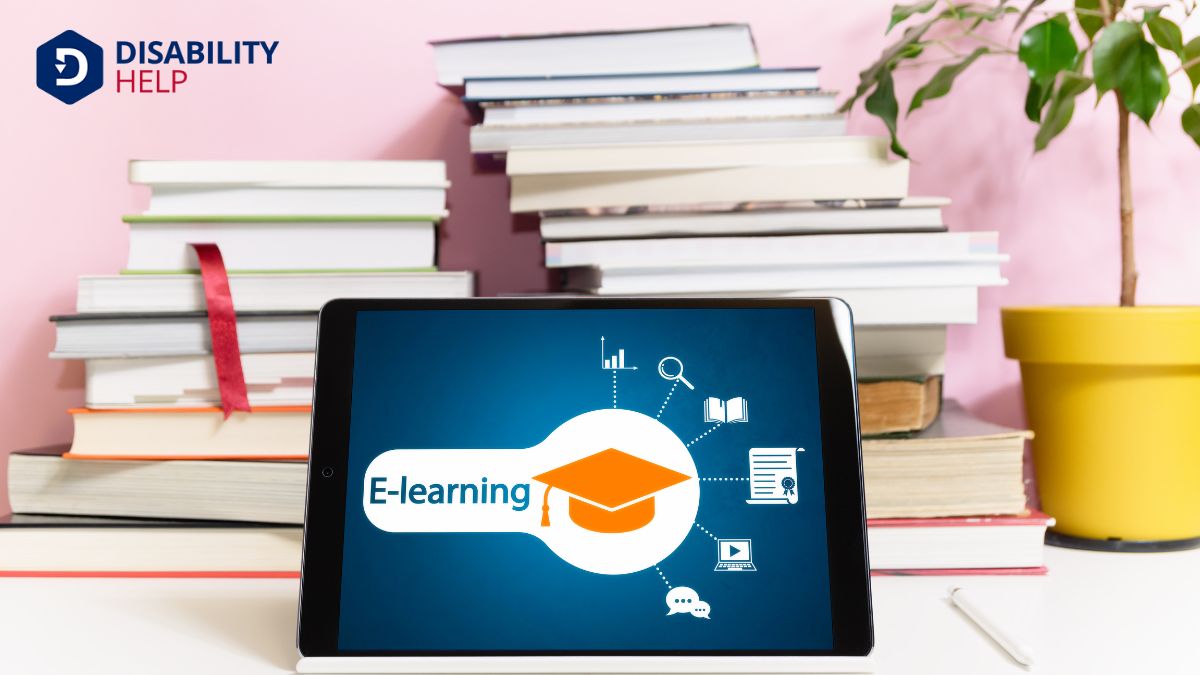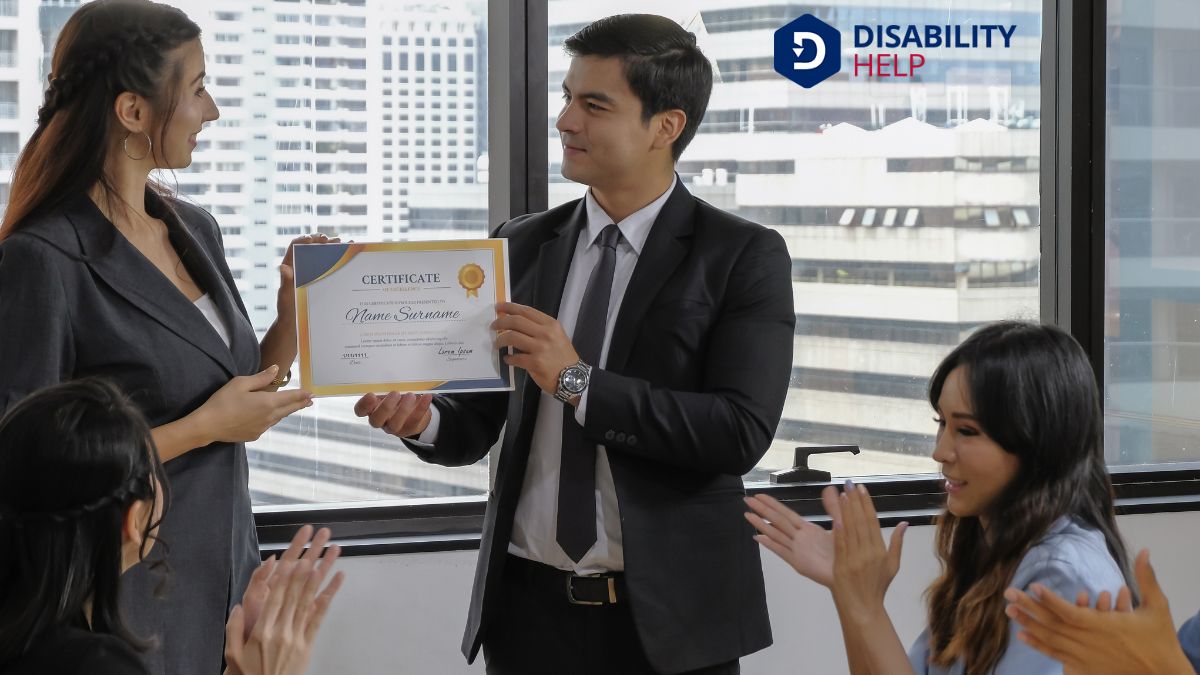We, as employers, can enhance our approach to disability inclusionThe practice of ensuring that individuals with disabilities have equal access to employment opportun... through various training options. Online courses let us explore key concepts flexibly, while in-person workshops offer engaging real-time interactions. Customized consultancy helps tailor strategies to our specific needs, and government-funded programs provide valuable resources. Industry-specific training and certifications address sector challenges, validating our commitment to inclusionThe practice of creating environments in which any individual or group can be and feel welcomed, res.... Each option empowers us to foster an inclusive environment. Let's explore these opportunities more deeply to truly excel.
Key Takeaways
- Online courses offer flexible and interactive modules on disability inclusion and legal compliance at your own pace.
- In-person workshops provide direct interaction with experts and peers through engaging activities and real-time practice.
- Consultancy services deliver customized training solutions to align with organizational goals for fostering inclusion.
- Government-funded programs like JAN and EARN offer resources for workplace accommodationsModifications or adjustments in healthcare settings to support patients with disabilities. and hiring practices.
- Industry-specific certifications provide practical tools and validate a commitment to disability inclusion across various sectors.
Online Courses and E-Learning Platforms

In today's digital age, online courses and e-learning platforms offer employers a flexible and accessible way to enhance their understanding of disability inclusion. These resources allow us to explore key concepts at our own pace, making it easier to integrate learning into our busy schedules.
By engaging with these platforms, we gain valuable insights into creating inclusive workplaces that embrace diversityThe inclusion of individuals from a wide range of backgrounds, including people with disabilities.. Interactive modules, videos, and quizzes keep us engaged and help reinforce our learning.
The variety of courses available means we can choose ones that best fit our needs, whether we're focusing on communication, accessibilityThe design of products, devices, services, or environments to be usable by people with disabilities...., or legal compliance. Online learning provides a supportive environment where we can revisit materials as needed, ensuring we fully grasp the essential components of disability inclusion in the workplace.
In-Person Workshops and Seminars
While online courses offer flexibility, face-to-face interaction in in-person workshops and seminars provides a different depth of learning.
We can engage directly with experts and peers, asking questions and sharing experiences, which enhances our understanding of disability inclusion. These sessions often include interactive activities and role-playing scenarios, allowing us to practice inclusive strategies in real-time.
Attending these workshops also helps us build a supportive network of like-minded individuals committed to fostering inclusion.
We gain insights from others’ experiences and challenges, which can be invaluable as we work towards creating an inclusive workplace.
Moreover, these workshops often feature guest speakers with disabilities, offering firsthand perspectives that deepen our empathyThe ability to understand and share the feelings of another, particularly important in understanding... and understanding.
Let’s embrace these opportunities to advance our knowledge and commitment to inclusion.
Consultancy Services for Customized Training
Although every organization has unique needs when it comes to disability inclusion, consultancy services for customized training can bridge the gap between standard practices and specific company requirements.
These services provide us with tailored solutions that address our distinct organizational challenges. Consultants assess our current practices, identify areas for improvement, and design strategies that align with our goals. By working closely with experts, we guarantee that our training is relevant and impactful.
We can focus on topics like communication strategies, accessible design, and inclusive recruitmentStrategies used by employers to attract and hire a diverse workforce, including individuals with dis.... A tailored approach empowers us to foster a truly inclusive environment.
It’s not just about compliance; it’s about creating a workplace where everyone thrives. With expert guidance, we can confidently implement changes that resonate with our team and lead to lasting impact.
Government-Funded Programs and Resources
Exploring consultancy services is a valuable step, and we should also consider the wealth of government-funded programs and resources available to support disability inclusion. These programs offer tools and strategies to help us create an inclusive workplace.
For instance, the Job Accommodation Network (JAN)A U.S. service that provides free, expert, and confidential guidance on workplace accommodations and... provides free consulting services to help us understand workplace accommodations and compliance with the Americans with Disabilities Act (ADA)A U.S. law that prohibits discrimination against individuals with disabilities in all areas of publi....
Additionally, the Employer Assistance and Resource Network on Disability Inclusion (EARN) offers webinars, online courses, and resources focused on hiring and retaining individuals with disabilities.
We can also access training through the Office of Disability Employment Policy (ODEP)A U.S. government agency within the Department of Labor that promotes policies and coordinates progr..., which provides guidance on policy development and employment practices.
Industry-Specific Training and Certifications

As we explore industry-specific training and certifications, we recognize their critical role in fostering disability inclusion within our workplaces.
Each industry has unique demands and challenges, and tailored training guarantees that we address these effectively. For example, the healthcare sector might focus on accessible patient care, while the tech industry could emphasize creating inclusive software.
Certifications from reputable organizations validate our commitment to inclusion and provide us with practical tools to implement effective strategies.
Conclusion
In our journey towards fostering disability inclusion in the workplace, let's embrace the wealth of training options available. Online courses and e-learning platforms offer flexibility, while in-person workshops and seminars provide interactive learning experiences. Consultancy services can tailor training to our unique needs, and government-funded programs offer valuable resources. Industry-specific training and certifications further enhance our understanding. Together, we can build a more inclusive environment where everyone thrives. Let's take the next step today!






